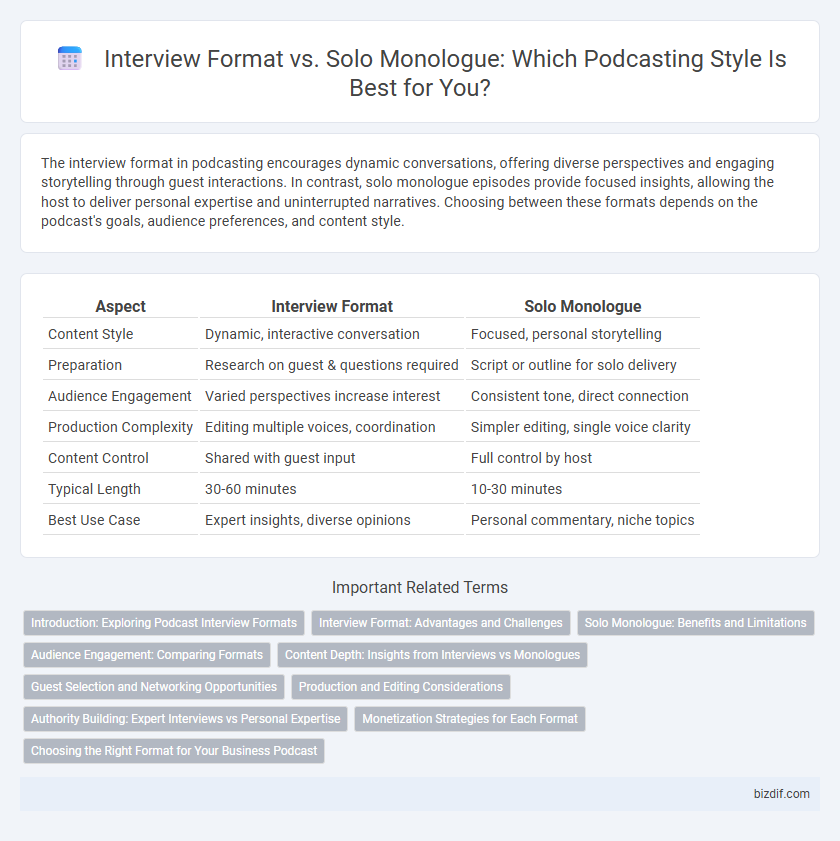The interview format in podcasting encourages dynamic conversations, offering diverse perspectives and engaging storytelling through guest interactions. In contrast, solo monologue episodes provide focused insights, allowing the host to deliver personal expertise and uninterrupted narratives. Choosing between these formats depends on the podcast's goals, audience preferences, and content style.
Table of Comparison
| Aspect | Interview Format | Solo Monologue |
|---|---|---|
| Content Style | Dynamic, interactive conversation | Focused, personal storytelling |
| Preparation | Research on guest & questions required | Script or outline for solo delivery |
| Audience Engagement | Varied perspectives increase interest | Consistent tone, direct connection |
| Production Complexity | Editing multiple voices, coordination | Simpler editing, single voice clarity |
| Content Control | Shared with guest input | Full control by host |
| Typical Length | 30-60 minutes | 10-30 minutes |
| Best Use Case | Expert insights, diverse opinions | Personal commentary, niche topics |
Introduction: Exploring Podcast Interview Formats
Podcast interview formats offer dynamic interactions that engage listeners through diverse perspectives and authentic dialogues, enhancing content richness and audience connection. In contrast, solo monologues provide focused, uninterrupted narratives that showcase the host's expertise and personal storytelling style, delivering deep dives into specific topics. Choosing between interview formats and solo episodes depends on the podcast's goals, audience preferences, and content strategy to maximize listener engagement and value.
Interview Format: Advantages and Challenges
The interview format in podcasting offers dynamic conversations that engage listeners through diverse perspectives and expert insights, fostering authenticity and relatability. It encourages spontaneity and depth, allowing hosts to uncover unique stories and nuanced viewpoints that solo monologues may lack. However, coordinating schedules and maintaining chemistry between host and guest can pose logistical challenges, while inconsistent audio quality and off-topic discussions require careful moderation.
Solo Monologue: Benefits and Limitations
Solo monologue podcasts offer creators full control over content, pacing, and style, enabling deep dives into niche topics that foster strong listener loyalty. This format requires minimal coordination, reducing production complexity and enabling consistent release schedules. However, the lack of interaction can limit dynamic engagement and diverse perspectives, potentially narrowing audience appeal compared to interview formats.
Audience Engagement: Comparing Formats
Interview formats boost audience engagement by introducing diverse perspectives and dynamic conversations, fostering active listener interest. Solo monologues offer deep dives into specific topics, attracting audiences seeking concentrated expertise and personal storytelling. Balancing these formats can optimize engagement, catering to varied audience preferences and content goals.
Content Depth: Insights from Interviews vs Monologues
Interviews offer diverse perspectives and in-depth insights by incorporating multiple expert viewpoints, enhancing content richness and listener engagement. Solo monologues provide a focused narrative with a consistent voice, allowing for detailed exploration of specific topics based on the host's expertise. Both formats contribute uniquely to content depth, with interviews fostering dynamic discussions and monologues delivering concentrated knowledge.
Guest Selection and Networking Opportunities
Choosing an interview format in podcasting enhances guest selection by attracting experts and industry leaders, expanding networking opportunities through diverse conversations that foster professional connections. The solo monologue format limits interaction but allows personalized storytelling and deeper focus on niche topics, appealing to a dedicated audience. Strategic guest selection in interviews significantly amplifies reach and credibility, making it a powerful tool for building a podcast's influence.
Production and Editing Considerations
Interview format in podcasting requires more intricate production and editing due to multiple audio sources, varying sound levels, and the need for seamless transitions between hosts and guests. Solo monologue episodes offer simpler editing workflows with consistent audio quality and fewer interruptions, allowing for streamlined post-production processes. Balancing these formats depends on available editing resources, desired episode length, and the complexity of content delivery.
Authority Building: Expert Interviews vs Personal Expertise
Expert interviews in podcasting enhance authority by showcasing diverse industry leaders and validated knowledge, attracting a broader audience. Solo monologues establish personal expertise through consistent, in-depth insights that build a loyal following and deepen listener trust. Combining both formats can strategically balance external credibility with authentic, individual authority in your niche.
Monetization Strategies for Each Format
Interview podcasts often leverage guest promotions, sponsorships, and cross-audience advertising for increased revenue streams, while solo monologues typically rely on direct listener support through memberships, Patreon, and exclusive content sales. Interview formats benefit from diverse advertising opportunities due to varied guest demographics, whereas solo shows maximize monetization through personalized listener relationships and targeted niche marketing. Both formats can effectively use dynamic ad insertion and affiliate marketing, but tailoring strategies to the podcast's engagement style enhances overall profitability.
Choosing the Right Format for Your Business Podcast
Selecting the appropriate podcast format directly influences audience engagement and brand positioning for your business podcast. Interview formats foster credibility and dynamic content through expert dialogues, while solo monologues allow for deep personal insights and consistent messaging. Analyzing target audience preferences and content goals ensures the format aligns with your marketing strategy and desired listenership growth.
Interview Format vs Solo Monologue Infographic

 bizdif.com
bizdif.com